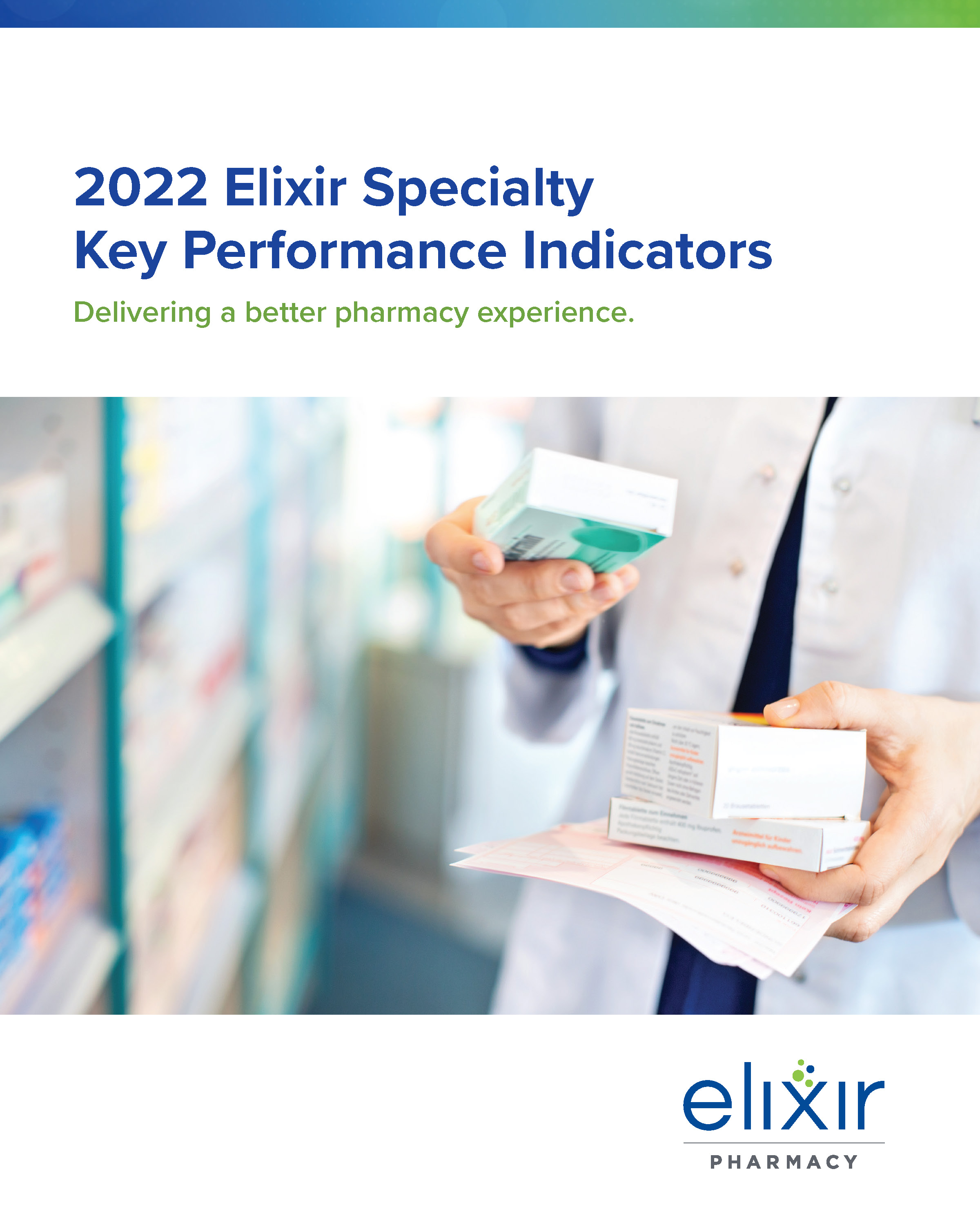Payers can better manage specialty drug costs if they take a close look at the specialty pharmacies their members are using. Prescribed to those with chronic conditions, specialty drugs can account for almost half of your drug spend and require special handling. You just can’t ignore any aspect of these medications from the specialty pharmacy and pharmacist that dispense the drug to the overall care of the patient. You should know if the pharmacies are specialists in the disease state. Do they offer condition-focused care? Are they helping your members overcome barriers to medication adherence? These questions and more should be considered when looking for ways to manage specialty drug costs.
Download the 2022 Elixir Specialty Key Performance Indicator Report to see how Elixir Specialty helps manage drug spend in the top disease states through personalized care.
What qualifies a pharmacy as a specialty pharmacy?
While any pharmacy can call itself a specialty pharmacy, the National Association of Specialty Pharmacies (NASP) defines a specialty pharmacy as a state-licensed and regulated pharmacy that solely or largely provides medications for people living with serious health conditions requiring complex therapies.[1] Unlike acute medications, the complexity of specialty medications and the diseases they treat require a customized clinical approach. Not all specialty medications have the same level of effectiveness for each patient, and there can be severe side effects or other complications if the treatment is not managed appropriately.
To demonstrate proficiency in managing specialty medications, some pharmacies seek accreditation. Of the 60,000+ pharmacies in the U.S., only 1,207 unique pharmacy locations achieved specialty pharmacy accreditation from the two major independent accreditation agencies: the Accreditation Commission for Health Care (ACHC), and/or URAC.[2] These accreditations demonstrate a commitment to quality, safety, accountability and adoption of nationally recognized standards of practice.
Additionally, the pharmacists at these specialty pharmacies may obtain condition-specific certifications, indicating expertise in a therapeutic class. For example, in just one therapeutic class, multiple sclerosis (MS), Elixir Specialty has pharmacists on staff that hold Multiple Sclerosis Certified Specialist (MSCS) certifications. This certification, awarded by the Consortium of Multiple Sclerosis Centers, focuses on a comprehensive understanding of MS, utilization of a multi-discipline MS care approach, and tools and resources to empower MS patients.
Individualized care makes a difference.
Just as the specialty medications can be complex, so are the conditions they treat. Individualized care customized by disease state and drug and continuous monitoring will drive the best possible results. Before the first dose is even dispensed, the specialty pharmacy should work with the patient to assess their risks and readiness for therapy, review their medical benefits, and track disease progression and adherence for better outcomes.
At Elixir Specialty, our specially trained pharmacists follow this care plan and work with patients prior to and throughout their medication therapy. Before shipment, we educate the patient on what to expect and assess their readiness to begin the treatment regimen. Additionally, when appropriate, we evaluate individuals for the optimal time to begin therapy to lessen the impact of potential side effects on pre-scheduled events, mitigate unnecessary therapy discontinuations and boost confidence with a successful treatment start.
Adherence matters.
Strong clinical evidence supports that those who are adherent to their medication regimen have fewer health-related issues and lower healthcare costs.[3] Specialty medications can sometimes cause barriers to medication adherence. Not all specialty medications have the same level of effectiveness for each patient and if a medication regime is too harsh, too confusing or comes with too many side effects, the patient may discontinue or reduce their medications. As treatment progresses, symptoms may change, side-effects may come and go, the medication’s effectiveness may wane. This means that the patient’s care team should monitor, adjust, change and intervene throughout the treatment to make sure the regimen is effective for the condition and can be adhered to by the patient.
Elixir Specialty recently published its 2022 Specialty Key Performance Indicators to report on the outcomes of our specialty care management and illustrate how care pathways improve member experience, increase medication therapy confidence and mitigate future risk of non-adherence. More than just numbers regarding outcomes, the document highlights the benefits of taking action to reduce costs and close care gaps like abandonment, disease progression and incorrect dosages. Clinical support, convenience of delivery and timeliness, along with several other metrics are tracked and measured to ensure the best possible patient experience.
Looking at the top conditions, Elixir Specialty consistently achieves superior adherence rates, outperforming industry benchmarks for medication adherence per therapeutic class.
|
Specialty Condition |
Description |
Elixir Specialty’s Medication Adherence Rate |
|
Inflammatory Conditions |
Makes up almost 50% of all specialty pharmacy prescriptions. |
93% |
|
Multiple Sclerosis |
Impacts over one million Americans.[4] |
93% |
|
Hepatitis C |
2.4 million Americans are living with Hepatitis C.[5] |
94% |
|
Cancer |
Around 1.8 million new cases of cancer will be diagnosed in the U.S. each year.[6] |
95% |
|
Allergic Asthma |
One in 13 Americans have asthma.[7] |
89% |
Missing doses can lead to complications, especially in complex conditions. Adherence rates by disease state can show how a specialty pharmacy is impacting the care of the patient. The better the adherence, the less healthcare costs this patient will generate.[3]
The above are just some of the considerations to look for in the specialty pharmacies your members are using. Other factors we measure in our Key Performance Indicators Report include: 90-day discontinue rates, biologic switch rates, average time spent with patients prior to therapy, and average savings for top interventions. We also measure member satisfaction, call handling and needs-by results. To see the full report, click here.
- National Association of Specialty Pharmacy, What is Specialty Pharmacy? Retrieved June 28, 2023, https://naspnet.org/wp-content/uploads/2019/08/What-Is-Specialty-Pharmacy-090718.pdf
- Drug Channels (2021) The Specialty Pharmacy Accreditation Boom Slows: DCI’s Exclusive Update on the U.S. Market, Retrieved June 28, 2023 https://www.drugchannels.net
- Kim, L., Combs, K. (2018) Medication Adherence: The Elephant in the Room, Retrieved July 21, 2023 U.S. Pharmacist, www.uspharmacists.com
- Luxner L. (2017). Nearly 1 Million Americans Have Multiple Sclerosis, NMSS Prevalence Study Finds. Multiplesclerosisnewstoday.com.
- Hofmeister MG, Rosenthal EM, Barker LK, Rosenberg ES, Barranco MA, Hall EW, Edlin BR, Mermin J, Ward JW, Ryerson AB. Estimating prevalence of hepatitis C Virus Infection in the United States, 2013-2016. Hepatology. 2018
- National Cancer Institute. Cancer Statistics (2020). https://www.cancer.gov/about-cancer/understanding/statistics
- National Asthma Data (2018). Centers for Disease Control and Prevention
* All internal survey data from 2022 Elixir Specialty Key Performance Indicators (KPI) Report.


